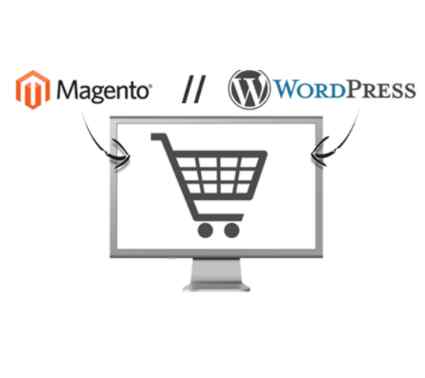| The Weekly Top 10: Mainly Magento |
| Written by Alex Armstrong | |||
| Thursday, 25 August 2016 | |||
|
In this week's round up of posts from external blog's you'll find Magento is a recurrent focus, with Shopify also making its presense felt. Drupal and Wordpress also get a mention.
drupalpartners.com - eCommerce Platform Price And Functionality ComparisonsWhen we decided to compare the various eCommerce platforms available, I was not expecting to find a gazillion options. I was really surprised that the majority number of eCommerce platforms is in the ready-made format, allowing entrepreneurs to instantly sell online. Let's jump into it and find what the top 5 eCommerce platform have to offer in terms of your eCommerce success.
websitemagazine.com - A Comparison of Magento vs. WordPress for eCommerce DevelopersIf you are currently operating a website, and looking to integrate eCommerce functionality into it, you might be confused with the two most popular solutions - Magento and WordPress. If you have some experience working with WordPress, Magento's complexity may seem quite daunting comparatively. In this article, we have highlighted why Magento is most preferred for eCommerce development, and some tips on how to use it flawlessly as you do with WordPress.
blog.hubspot.com - eCommerce Tips From A Magento Expert: The Differences Between Adaptive and Responsive DesignA few corporations simply haven't gotten the message yet that the online world has changed profoundly due to the introduction of a plethora of connected mobile devices. If they don't make the switch to a responsive design solution soon, these corporations are going to get left behind when it comes to making the most of their websites for online marketing, social media and eCommerce. There are still hold-outs in the corporate world, however, when it comes to responsive website design.
mageinferno.com - Magento 2 Development with Docker on OS XDocker has been making it's way all around the world, and containerization is here to stay. PHP development has always been fairly easy to setup on Mac OS X, however with the ever-increasing new releases of PHP (5.4, 5.5, 5.6, 7.x...), you'll eventually come to a point where you'll need to manage multiple projects at the same time, all perhaps running different software versions. There are so many variables that come into play with running different versions within different environments, and you never want to hear "Well, it runs on my dev. Why doesn't it run on yours?". and you may want to run PHP 5.6 on your Magento 2 install to test out some new features, while still running PHP 5.4 for your Magento 1.x installations. And when PHP 7 is released, it's all downhill from there... Even if you are running something like Ubuntu from dev through prod, you'll still have situations where system packages or software versions don't exactly match each other between environments. And we all love to develop on our Mac. So, Docker to the rescue!
marketingadept.com - Magento Developers: Add a Custom Field to the Category Admin PageThe ability to tailor a Magento installation to a specific business' needs can be critical for SEO performance. Our solution was to create a custom text field on our Category configuration pages within the Magento backend. Here's how we did it.
gauss-development.com - Magento Mass Product ImportThe goal is to import several thousand products in a short time involving pictures, sort by categories and attribute sets. Problem: If you "surf" the Internet and try to find a quick and easy way to import several thousand products in your Magento shop, you will notice the type of answers: impossible, too slow, too much memory usage, etc. This post describes the solution to the problem.
wern-ancheta.com - Getting Started With Shopify App DevelopmentIn this article I'll be showing you how to start developing apps for Shopify. But first of all what is Shopify? Shopify is an online eCommerce platform, you can use Shopify to create online stores to sell goods and services.The only difference between Shopify and other eCommerce solutions like Wordpress or Joomla is that you don't have to install anything yourself. If you've ever used a Content Management System like Wordpress or Drupal you might have noticed that the plugin or modules are uploaded into the site were Wordpress or Drupal is running. But in Shopify you don't need to upload anything. Shopify apps are basically hosted on a different server. So the creators of the App takes care of all the resources needed by the app to run. Here's how to begin.
nozzlegear.com - The Developer's Guide to Shopify Script TagsIn this tutorial, we'll cover everything you need to do to build a solid email capture widget. The store owner will be able to customize it, and then we'll load it onto their store front to start capturing emails. We're also going to cover two different ways to load those customization options into the widget - from your backend app while it's serving the script, or from the client-side script itself. By the time we're done, you'll have a solid understanding of everything that you can do with the Shopify script tag API - and everything you can't do.
heliumdev.com - 5 Common Pitfalls when Developing a Shopify ThemeI've worked with a fair amount of Shopify themes at this point, and there's some trends I've noticed over time. Here's some tips to avoid while you set out to build a Shopify theme. Remember that you're not the only one working on your theme. gotgroove.com - Developer's Toolbox: Using Magento EventsIn this high-level post, I aim to outline what Magento events are, and the benefits to using them. By thinking about events as you define your business logic, you make it easier to get the most benefit out of extensions. From Our PartnersElectric Cloud - Release Management Wiki: The First Knowledge Hub on Software Release ManagementElectric Cloud set out to create a wiki-based knowledge hub that would collect all the relevant information from around the world on software release management, and organize it into a meaningful structure, to help the community understand and learn this important discipline. The wiki covers over 200 topics: release automation, agile practices, ITIL/ITSM concepts, deployment, release planning, and more. Related ArticlesOther Weekly Top 10sJavaScript Development Resources SharePoint and Other CMS Platforms AngularJS Web Development Resources JavaScript Programming Resources To be informed about new articles on I Programmer, sign up for our weekly newsletter, subscribe to the RSS feed and follow us on Twitter, Facebook, Google+ or Linkedin.
|
|||
| Last Updated ( Thursday, 06 October 2016 ) |










